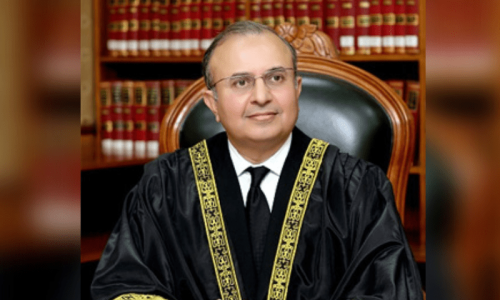IT is rare that the plush hall of the National Assembly echoes with policy talk for hours on end. So it was a welcome sight, according to eyewitnesses, that nearly a hundred top politicians and legislators huddled with the military leadership for nearly eight hours and discussed hard options on Afghanistan.
The briefing by the Director General of the ISI Lt Gen Faiz Hameed started a little after 3pm on Thursday as his boss, Chief of the Army Staff Gen Qamar Javed Bajwa looked on. By the time the session, which included Q&A and speeches, ended the clock had already chimed 11pm. The briefing was originally meant for the committee on national security but as its scope enlarged, other political leaders including the provincial chief ministers were invited to attend. The main hall of the National Assembly was converted into a committee room by the orders of National Assembly Speaker Asad Qaisar to accommodate the large number of participants.
There were no verbal fireworks, no blistering criticism and no snide remarks about ‘selected’ and ‘selectors’.
In fact, the seating arrangement was rather unconventional. While the treasury and opposition members sat on their respective sides of the aisle, the speaker and the chairman Senate did not sit on the main elevated desk where they normally are seated. Instead, tables were placed on the main floor. The army chief and DG ISI sat in front of the front row of the treasury benches facing them, while the speaker and the chairman Senate sat on a table in front of the front row of the opposition benches. A screen was placed in front of the desk where the secretary National Assembly sits and it was on this screen that the DG ISI gave a PowerPoint presentation that lasted more than an hour. This was followed by questions that turned into speeches.
According to the participants, almost all the discussion focused on the situation in Afghanistan and the likely fallout for Pakistan. There was little time left for other issues like Kashmir, and therefore it was decided to have a follow-up meeting before Eid.
Read: Pakistan's politics will change after military's security briefing to lawmakers, says Sheikh Rashid
Politics did not figure much in the discussion. Mohsin Dawar of the PTM in his speech referred to the manipulation in the 2018 elections but the response was that if there had been manipulation how did he win. The prominent speakers included Shehbaz Sharif, Bilawal Bhutto-Zardari, Shahid Khaqan Abbasi, Fawad Chaudhry and Sheikh Rashid. According to those present, there was not much difference of opinion in terms of the policy that Pakistan should be pursuing, though some people were slightly more pro-Taliban than others. Maulana Asad ur Rehman, son of Maulana Fazlur Rehman apparently spoke in very positive terms about his family supporting the state.
What was interesting was the cordial environment during the entirety of the eight hours. No verbal fireworks, no blistering criticism and no snide remarks about ‘selected’ and ‘selectors’. The whole scene was rather surreal, almost reflecting that way that ‘normal’ policy discussion takes place. Many speakers were rather glowing in their appreciation of the role that the military leadership has been playing.
So what are some key takeaways from the briefing? Here are five points:
The briefing and the exhaustive session established the chain of communication between the three key stakeholders in a national policy: government, opposition and the establishment. Since the last three years, this communication has been almost non-existent. The breakdown of a working relationship between the treasury and the opposition benches, and the hostility of the opposition towards the establishment since the PDM movement took off had ensured that there was negligible contact and serious discourse among them. On the issue of Afghanistan — that is feared to deeply impact Pakistan — the entire federal and provincial leadership needed to be on board. The briefing has kick-started this process by injecting a dose of normalcy in the intra-stakeholder discourse.
The optics have also injected a sense of quasi-healing between the opposition and the establishment. At a time when the general perception being fed was the government and the establishment on one side and the opposition on the other, Thursday’s briefing has — at least on the face of it — brought the establishment more in the centre. The marathon session provided everyone present an opportunity to have a normal conversation in an antagonism-free environment on a topic that affects everyone. This could provide a foundation for a more consultative process in the coming weeks and months.
The absence of the prime minister has generated controversy. During the session when one member of the opposition complained why the PM was not present, the army chief reportedly said he had been informed that the opposition did not want him to attend. Speaker Asad Qaisar then spoke up and said his office had received a message that the opposition would review its participation if the PM came to the briefing. The opposition has flatly denied this. However, the PM’s absence did in fact dilute the impact of the briefing in terms of bringing the entire leadership together under one roof.
The ice was broken about a face-to-face discussion on the PTM. Shahid Khaqan Abbasi argued that the establishment should engage the PTM constructively. Bilawal Bhutto-Zardari also spoke in favour of detained PTM MNA Ali Wazir and demanded that he be released.
A key issue discussed was the approach towards the United States. It was generally acknowledged that Pakistan would not provide military bases to the Americans but at the same time it was also said that relations with the US were important for Pakistan at a strategic level. There needed to be nuance in our approach.
The participants were generally satisfied with the session and most said it was a step in the right direction in terms of bringing greater cohesion in strategic policymaking.
The writer is Dawn’s resident editor in Islamabad.
Twitter: @fahdhusain
Published in Dawn, July 3rd, 2021












































